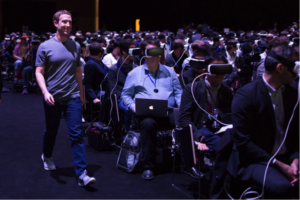By: NJ Senthilkumar, '19 Last month, Facebook hosted its annual F8 Developer Conference in San Francisco, when the company talked about developments in current and future Facebook products. Many exciting innovations such as Live Video and Facebook Messenger’s e-Commerce Chatbots were the highlights of the conference. Many people are especially excited about Facebook’s new plan for developing a new social virtual reality experience.At the F8 conference, Facebook CEO Mark Zuckerberg showed off the latest version of its social VR prototype, which included new features like customizable virtual avatars, new gestures that trigger “VR emojis”, videospheres, and the ability to make video calls using VR via Messenger. Facebook also revealed plans for a new standalone headset geared strictly toward their new VR social experience.In 2014, Facebook bought Oculus, a technology company specializing in virtual reality, for $2 billion, a move that many industry experts thought was “a bold yet dangerous bet for Facebook.” At the time, many people were confused why the social media company would invest in a technology company geared towards hardcore gaming enthusiasts. However, the answer is clear now that the investment was in Facebook’s long-term vision to keep the company on the cutting-edge of an online social experience.Facebook Social VR Product Manager Mike Booth states, “The current trend we see is that people are interacting less with a keyboard and mouse, which is changing what our online social networks look like. It is only a matter of time before virtual reality and social media cross paths.” Many other major players like Google, HTC, Sony, Samsung, and Twitter have noticed this trend and are attempting to control the single-user side of the virtual experience, as shown by new products like Google Daydream and HTC’s Vive. Yet, it seems that only Facebook has the power to control both the single-user side and social experiences VR offers.Although in its early stages, the “ToyBox” demo that Facebook revealed at the F8 conference showed what a potential social VR field could look like. Facebook plans to make VR much more social by giving users a sense of inhabiting spaces together. Some critics have raised concerns that the nature of the VR industry is “disconnecting from the real world,” but Facebook aims to change that notion by delivering what the company calls “a new social presence” – where users are interacting with other people and sharing real experiences when using multiperson VR.It is a safe bet to make that Facebook will not reveal this “social VR experience” in the coming year and only show its new technology when they are capable of delivering this “social presence.” Nevertheless, there is definitely a clear vision for Facebook to remain a leader in directing and defining what the online social experience will be in the future. Sources:https://www.fastcompany.com/3058914/how-facebooks-social-vr-could-be-the-killer-app-for-virtual-realityhttp://www.roadtovr.com/facebook-plans-to-launch-social-vr-offering-as-soon-as-possible/http://www.androidheadlines.com/2017/01/facebooks-social-vr-experience-nearing.htmlhttp://www.theverge.com/2016/10/7/13204022/facebook-social-vr-michael-booth-oculus-connect-interviewhttp://www.roadtovr.com/wp-content/uploads/2016/07/Mark-Zuckerberg-samsung-gear-vr.jpg
Last month, Facebook hosted its annual F8 Developer Conference in San Francisco, when the company talked about developments in current and future Facebook products. Many exciting innovations such as Live Video and Facebook Messenger’s e-Commerce Chatbots were the highlights of the conference. Many people are especially excited about Facebook’s new plan for developing a new social virtual reality experience.At the F8 conference, Facebook CEO Mark Zuckerberg showed off the latest version of its social VR prototype, which included new features like customizable virtual avatars, new gestures that trigger “VR emojis”, videospheres, and the ability to make video calls using VR via Messenger. Facebook also revealed plans for a new standalone headset geared strictly toward their new VR social experience.In 2014, Facebook bought Oculus, a technology company specializing in virtual reality, for $2 billion, a move that many industry experts thought was “a bold yet dangerous bet for Facebook.” At the time, many people were confused why the social media company would invest in a technology company geared towards hardcore gaming enthusiasts. However, the answer is clear now that the investment was in Facebook’s long-term vision to keep the company on the cutting-edge of an online social experience.Facebook Social VR Product Manager Mike Booth states, “The current trend we see is that people are interacting less with a keyboard and mouse, which is changing what our online social networks look like. It is only a matter of time before virtual reality and social media cross paths.” Many other major players like Google, HTC, Sony, Samsung, and Twitter have noticed this trend and are attempting to control the single-user side of the virtual experience, as shown by new products like Google Daydream and HTC’s Vive. Yet, it seems that only Facebook has the power to control both the single-user side and social experiences VR offers.Although in its early stages, the “ToyBox” demo that Facebook revealed at the F8 conference showed what a potential social VR field could look like. Facebook plans to make VR much more social by giving users a sense of inhabiting spaces together. Some critics have raised concerns that the nature of the VR industry is “disconnecting from the real world,” but Facebook aims to change that notion by delivering what the company calls “a new social presence” – where users are interacting with other people and sharing real experiences when using multiperson VR.It is a safe bet to make that Facebook will not reveal this “social VR experience” in the coming year and only show its new technology when they are capable of delivering this “social presence.” Nevertheless, there is definitely a clear vision for Facebook to remain a leader in directing and defining what the online social experience will be in the future. Sources:https://www.fastcompany.com/3058914/how-facebooks-social-vr-could-be-the-killer-app-for-virtual-realityhttp://www.roadtovr.com/facebook-plans-to-launch-social-vr-offering-as-soon-as-possible/http://www.androidheadlines.com/2017/01/facebooks-social-vr-experience-nearing.htmlhttp://www.theverge.com/2016/10/7/13204022/facebook-social-vr-michael-booth-oculus-connect-interviewhttp://www.roadtovr.com/wp-content/uploads/2016/07/Mark-Zuckerberg-samsung-gear-vr.jpg
